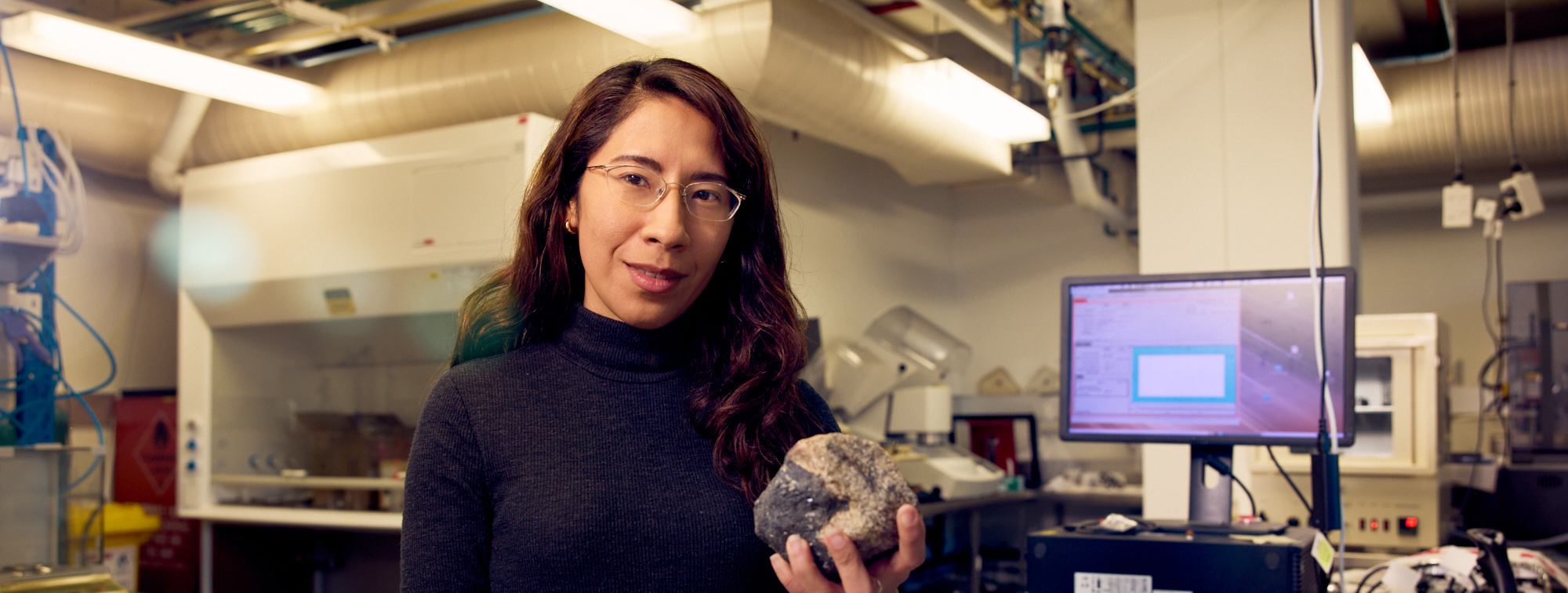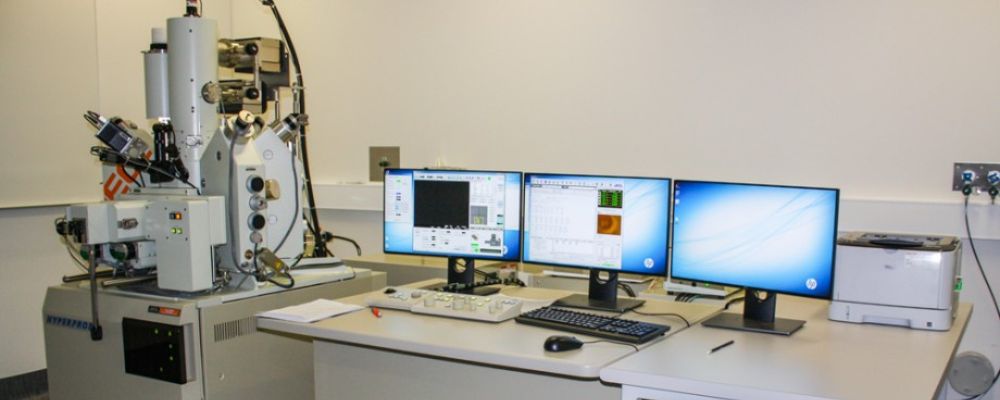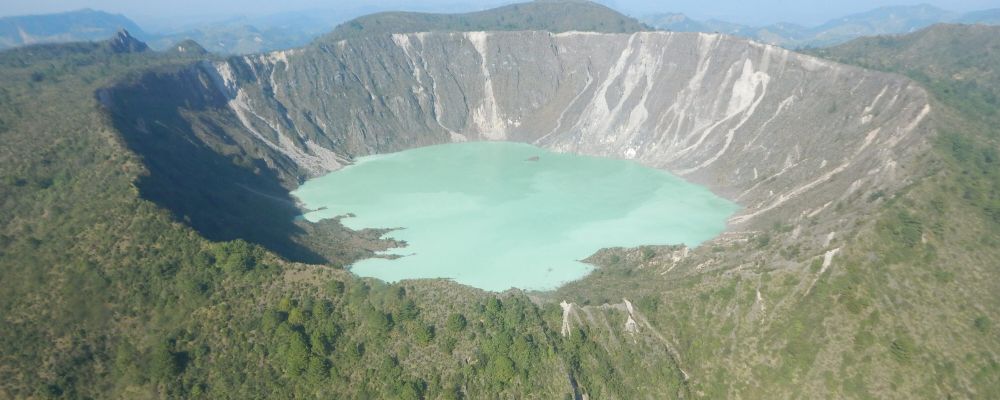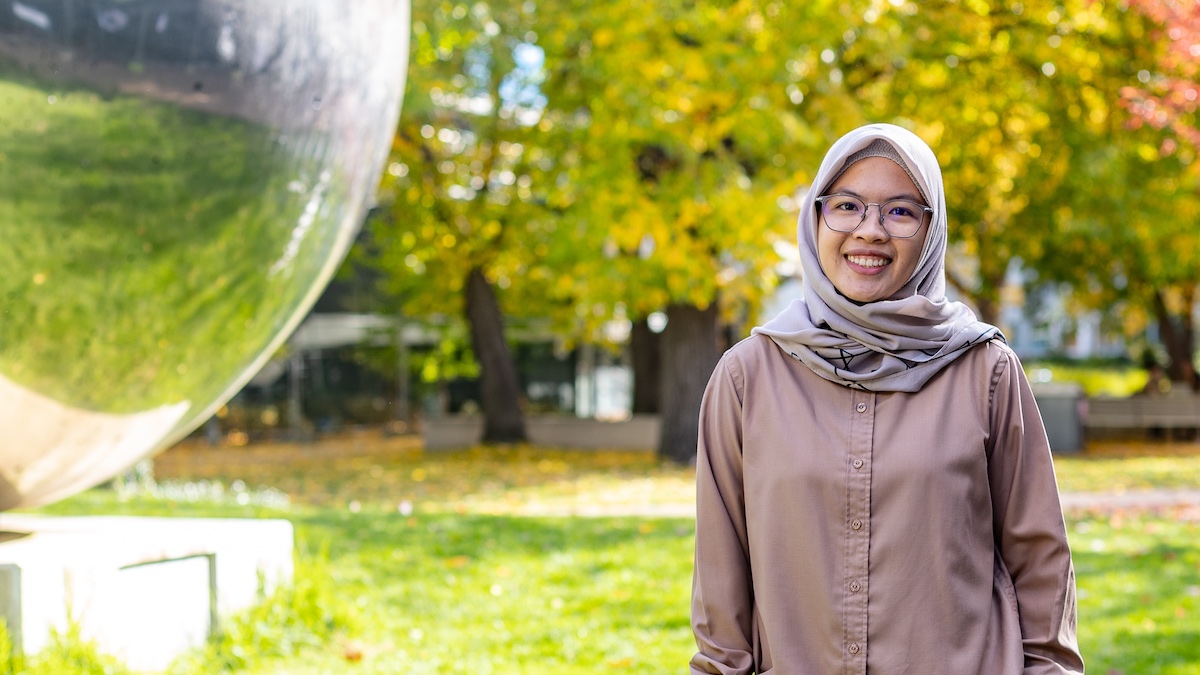
Published on
Dr Ana Casas Ramos: from deadly volcanoes to rock detective
ANU researcher Dr Ana Casas Ramos has always had a way of seeing beyond the surface. Whether she's deciphering the signals of a volcano or unravelling the hidden stories locked within a rock, Dr Casas Ramos approaches her work with the curiosity of a detective and the precision of a scientist. Now, as a research fellow at ANU, she’s using cutting-edge technology to push the boundaries of what we know about our planet. In this conversation, Ana opens up about her academic journey and the unexpected twists that have shaped her career.
In simple terms, describe what you do.
I'm a research fellow at the Department of Materials Physics (School of Physics) at ANU working on characterising rocks in 2D and 3D. The process consists of taking computer tomography images—like the ones done for scanning the human body—to create a full 3D image of the rock. Then, I take a subsample of the rock and examine it under an electron microscope to precisely identify what minerals are in there.
Finally, we propagate the information from the microscope into the 3D image to gain a comprehensive understanding of the number and location of valuable minerals, which gives us insights into how to liberate them.
"It’s like being a ‘rock-detective’—you see what the rocks are made of and then think about how they came to be and what processes have shaped them."
What’s a typical day in your life look like?
I love starting my day with a run; it puts me in a great mindset for the morning. Once I arrive at the University, I have a chat and a coffee with colleagues and then get to work. Lately, I've been working a lot at the Centre for Advanced Microscopy (CAM) analysing my samples using a Scanning Electron Microscope, which allows me to look at minerals at a micrometre scale.

Ana uses advanced microscopes to explore minerals at depths beyond what the eye can detect. (Pictured: the JEOL 8530F Plus Electron Probe Microanalyser).
What’s something about your work or field that you find fascinating?
My background in volcanology showed me how alive the earth truly is. My previous research taught me how to interpret some volcanic signals, understand their state and internal processes, and detect periods of unrest.
Now, working with rocks, I can also see that they have a story to tell. Some minerals form only under specific temperature and pressure conditions, so you can tell how and why the rock formed; it's all in there, and I love unravelling their stories.
Who inspires you?
Definitely my parents, Miguel and Silvia. They're both academics in my native Mexico. My dad is a professor of library science and my mum is a volcanologist. They have dedicated their lives to contributing to society and academia with such commitment, passion and love for their country that I could only try to follow in their footsteps and become an academic myself. As a woman, my mum is the ultimate role model for me.
She alone started the volcanic monitoring of Mexico's deadliest volcano (El Chichón) at a time when women weren’t treated equally. It was very hard, but she persisted, and thanks to her, this volcano won't catch people by surprise again.

Ana and her family study volcanos and their signals, including Mexico’s deadliest volcano, El Chichón.
What are some things about you that people might be surprised to learn?
- Thanks to my PhD in Munich, I became fluent in German—some say I sound too Bavarian, but that's okay.
- Despite Mexican food being exquisite (I'd argue it's the best in the world), I never really learned how to cook it, so I only eat Mexican food when I visit my parents.
- I play the ukulele in my free time. It was a lifesaver during my PhD; if I was too stressed, I would go outside, sit on the grass and play some tunes. It was a great way to relax.
- I love ANZAC biscuits! I bake them all year long and have two every day.
“The Earth is always telling us something and it is up to us to listen and try to understand."
What's one lesson you've learned throughout your career?
Nothing ever goes according to plan and that's not a bad thing. You can plan every detail of your personal and professional life, but so many external factors always change things. The trick here is to see the potential benefits of proceeding under the new circumstances, to see them as opportunities for learning and growing instead of seeing obstacles.
I don't regret things not going according to plan because all the things I've experienced (good and bad) have been lessons that made me resilient and stronger and I wouldn't be here if that hadn't happened. Planning is good, but learning how to adapt is better.
What do you find most rewarding about being an academic researcher at ANU?
I love how much I'm learning in this project. I'm witnessing and actively contributing to advancing science and technology in characterising geological materials. Due to the increasing demand for minerals necessary for energy transition, this research is crucial to reach Net Zero emissions by 2050.
If we can better understand the mineralogy and physical behaviour of rocks, we can extract minerals better and contribute to developing more efficient mining processes. Yes, we'll need more mining, but we also need smarter mining. Contributing to this goal satisfies both my scientific curiosity and my commitment to serving society and, for this, I'm very thankful.
What’s one thing you always make time for, no matter how busy life gets?
Sport, for sure! I live by the saying: "Mente sana en cuerpo sano," which translates to "healthy mind in (a) healthy body". At universities, we’re so focused on researching under highly demanding timeframes that it’s easy to overlook our physical health.
I run in the morning, commute by bike daily and play soccer twice weekly. Playing team sports is a great way to meet new people, improve relationships with friends or build rapport with work colleagues. I also find it a lot of fun! I always tell my team, "It's not about winning, it's about having fun", but of course, it is always great to win the match.
What do you think makes ANU unique?
Many things! I'm always amazed by the scientific infrastructure available on campus, such as the laboratories at the School of Physics, the Centre for Advanced Microscopy (CAM), the National Computational Infrastructure (NCI), and the National Laboratory for X-Ray Micro Computed Tomography (CTLab), but also by the brilliant human resources working in these facilities. It is mind-blowing to see and have access to such state-of-the-art technology.
The campus is also beautiful. I enjoy coming to work, seeing so many green areas and looking at the native birds. I enjoy attending ANU events, discussion panels, book presentations and workshops. There's always something interesting going on.
What’s one piece of advice you’d give to future students who are just about to embark on their university journey?
Don't let fear dictate your decisions. When I first left Mexico to do my PhD in Germany, it was scary. I didn't know anyone there, I didn't speak the language, and I knew I wouldn't see my family often. But I was also very excited. I knew I would learn a lot, widen my professional network and grow from the whole experience. After six years of living in Munich, I got the opportunity to come to Australia. It was scary to think of all I would leave behind (again), but I also thought of all the learning and new life experiences I'd have. I would do it all over again!
It is normal to have fears in life, but if you let them hold you back, you might miss out on wonderful experiences.

